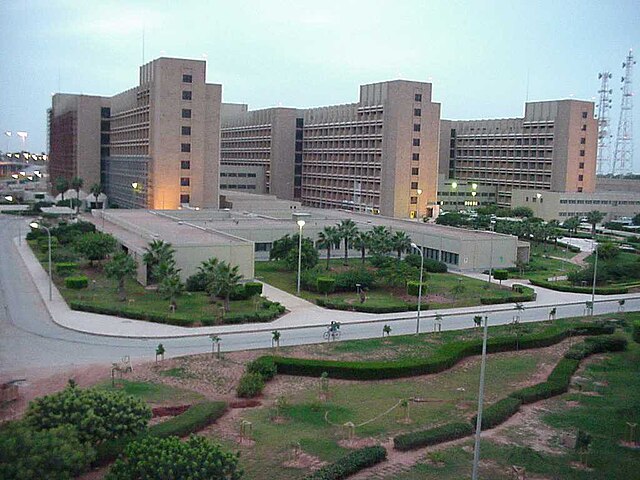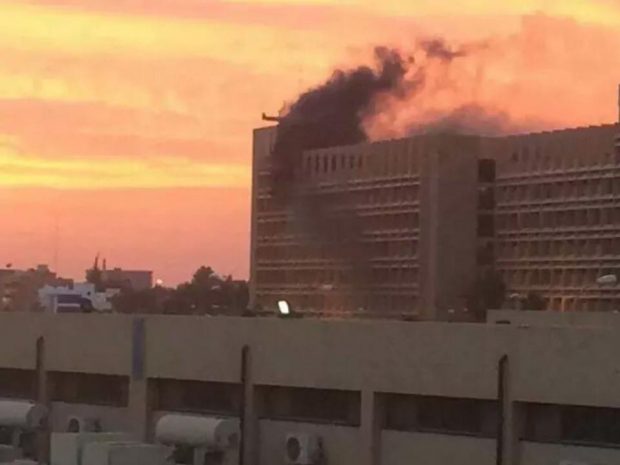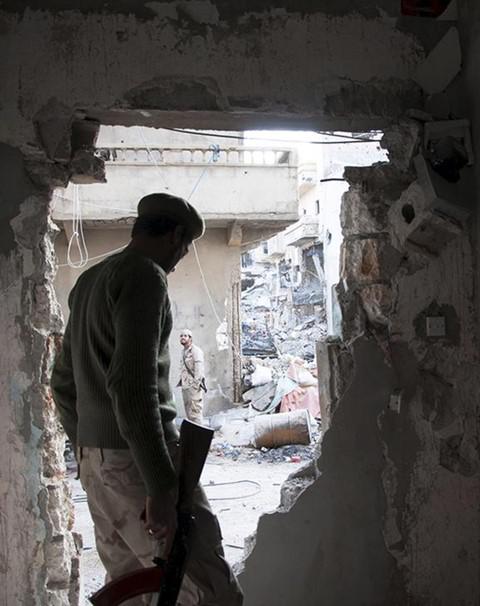On May 10, a conference will be held in Washington, organized by the National Council on US Libya Relations and the National Council on US-Arab Relations, with support from several think tanks including the Beirut Institute. The
conference, titled “New Vision, Hope and Opportunities,” will be attended by former Libyan prime ministers, representatives from the governing presidential council, the foreign minister, and UN envoy Martin Kobler. The conference will review the past six years as a necessary basis for the future once mistakes are recognized and obstacles identified.
The conference will address the fate of the Sukhayrat Agreement, which had proposed a roadmap for Libya, to explore the prospects of it succeeding in the coming period and whether it needs amending. The meeting will also tackle the security complexities in Libya and the region, with experts making interventions on regional roles, militias, Daesh and the Libyan National Army led by Gen. Khalifa Haftar.
“Frankly, we are very pessimistic about the Europeans leading on the Libyan issue, especially by the Italians and the British... from the Sukhayrat Agreement to the Security Council,” said Dr. Hani Shunaib, founding president of the National Council on US Libya Relations. “We want to raise the Libyan issue from the bottom of priorities to become worthy of the interest of the new US administration and Congress, by adopting realistic and serious proposals.”
These proposals include
pushing for strong US leadership to gather all Libyan parties in one room for prolonged discussions, parties that include both those who support and oppose the Sukhayrat Agreement, in order to amend its clauses and impose the amended version on the parties, including Parliament, Haftar and the Islamists in Tripoli, said Shunaib.
“
Parliament must be included in the dialogue,” he added, or it “will continue to reject the government led by Fayez Sarraj formed on the basis of the Sukhayrat Agreement, and Sarraj will continue to steer the Libyan ship without parliamentary legitimacy out of a naval base outside Tripoli.” The Libyan dinar will continue to slump, the economy will continue to deteriorate, and the risk of military confrontation between the armies of the Islamists and Haftar will increase, especially in the south, Shunaib said.
No one is saying the
Libyan issue is not
astoundingly complex. The UN and US under Barack Obama backed the Sukhayrat Agreement and considered Sarraj the only internationally recognized leader. But the Libyan Parliament remains internationally recognized as the legitimate legislative authority in the country.
The regional complications are also noteworthy.
The UAE, for example, backs Haftar as a spearhead against radical Islamist expansion in Libya. The UAE has not concealed its fight against extremism in Egypt and elsewhere too, because it sees it as an existential threat.
Qatar does not share this view, and
has supported Islamists in Tripoli either directly or via Turkey, because it believes Islamist parties have the right to participate in government everywhere.
Egypt sees Libya as having important strategic depth.
It
relies significantly on Libyan oil imports and has an army of workers across the border. Yet the top priority for Cairo remains
the threat of Islamist extremism, which it wants to head off in Libya without becoming directly involved militarily in the quagmire. The other important neighbor is
Algeria, which has had prolonged differences with Libya over borders and oil. Algeria does not want a vacuum through which terrorism can enter its territory.
Saudi Arabia is leaving the Libyan issue to the UAE and Qatar,
proposing itself as a neutral party trying to resolve it. But according to Libyans, the Kingdom can play a role in stopping the export of extremist Salafists to North Africa, particularly Libya. One of them said there are “very worrying signs in the eastern region, where Islamist extremism has made a comeback through the Salafists to impose restrictions on civil rights.” One example he cited is how the religious authorities in Barqa recently imposed a decision on the military governor in the eastern region to prevent women in Libya from leaving the house without a male guardian.
Libya will not become a modern state unless it adopts the 1969 constitution as the basis of a secular constitution, and rejects amendments that impose an Islamic state. The international community can help fundamentally in this regard. The Obama administration had adopted so-called centrist Islam as an acceptable way to introduce religion in Arab states without opposition from the international community. But the Trump administration does not share this view, which provides an opportunity to think of new ways to address the Libyan crisis.
The Trump administration does not believe in appeasement, which had marked Obama’s approach to this issue, and prefers the separation of religion and state.
Some have accused the Trump administration of seeking the partition of Libya, based on positions made by some advisers but not on declared policies. Those advisers are talking about
a new US policy that takes into account the possibility of federalism in Libya. Shunaib said the Sukhayrat Agreement could be amended to take into account “historical backgrounds that were not accommodated before,” including the fact that Libya comprises three historical states: Barqa (Cyrenaica), Tripoli and Fezzan. A decentralized federal system must be seriously considered, with more than three states — five or six — because the centralized system is inconsistent with Libya’s history, he believes.
Today we are in an era of radically different policies, in which Libya deserves American and European attention because of the implications for US interests and strategic positioning.
Raghida Dergham
Shunaib recalled that
before 1969 and Gaddafi’s regime, Libya had two capitals, Benghazi and Tripoli, due to historical differences, and that Muammar Gaddafi had “punished the eastern region, completely neglecting Barqa.” So today “another city should be considered practically, such as Sirte, to be a provisional capital that can be protected.” Such a neutral capital should be one of the important amendments to the Sukhayrat Agreement, he believes.
He also called for
guaranteeing the sovereignty of institutions, especially the oil corporation and the central bank, with a UN Security Council resolution. He also called for seriously considering the
creation of a new army, which could be a federal army.
“Haftar must be co-opted into political dialogue rather than be excluded, while Islamists should be made to choose something that is in their interest, since they historically comprise the merchant class in Tripoli and Misrata.”
These ideas will no doubt be met with opposition and criticism from some circles, but they are helpful as a basis to revive the Libyan issue in the US and internationally. There is a
chance for US-Russian dialogue that could lead to accord or cooperation in Libya, where the two countries have shared interests that go beyond terrorism and include economic interests, especially after reports of the discovery of the largest gas basin in North Africa, and possibly the Mediterranean, in the Gulf of Sirte.
Russia has shown a special interest in Libya, but the US has yet to do so. The time has come for Washington to change tack. Libya is crucial to the security of North Africa, Europe, the US and Russia because the ongoing vacuum will lead to eventual Afghanization and Somalization so close to Europe. Libya, Shunaib recalled, is a resource-rich country whose oil has special qualities that make it ideal for petrochemical industries, and so has a special value for the US.
Libya was born with a UN resolution in 1951, but was never a state in the modern sense. It is time to re-create Libya as a modern state based on a realistic vision that respects the constitution and institutions, not on appeasement. The international community owes it to Libya, and stands to gain from helping its people and trying to preventing a further power vacuum and collapse.
• Raghida Dergham is a columnist, senior diplomatic correspondent, and New York bureau chief for the London-based Al-Hayat newspaper since 1989. She is dean of the international media at the UN. She is a member of the Council on Foreign Relations, and an honorary fellow at the Foreign Policy Association. She served on the International Media Council of the World Economic Forum, and is a member of the Development Advisory Committee of the IAP — the Global Network of Science Academies. She can be reached on Twitter @RaghidaDergham.
http://www.arabnews.com/node/1092281
















